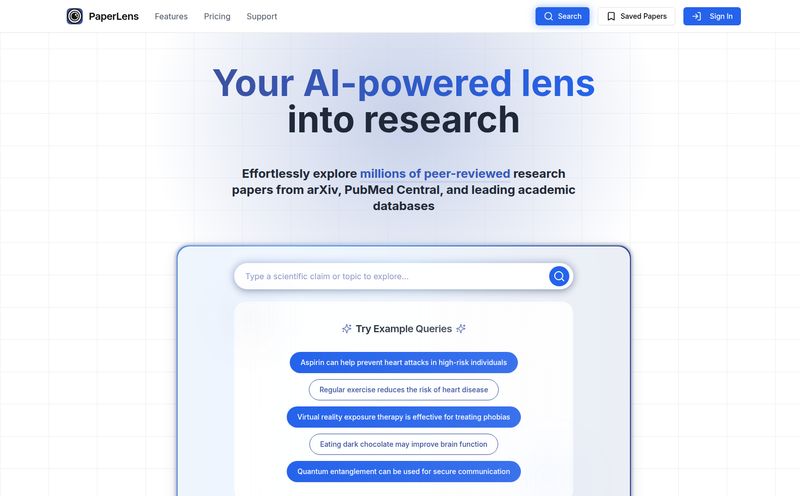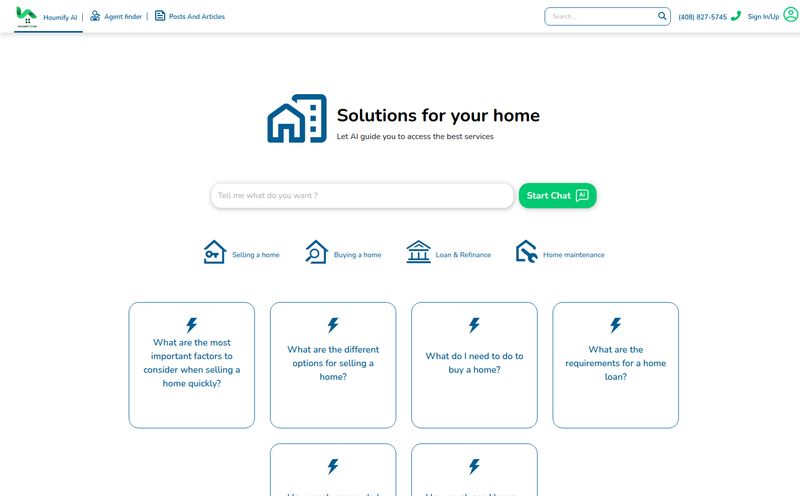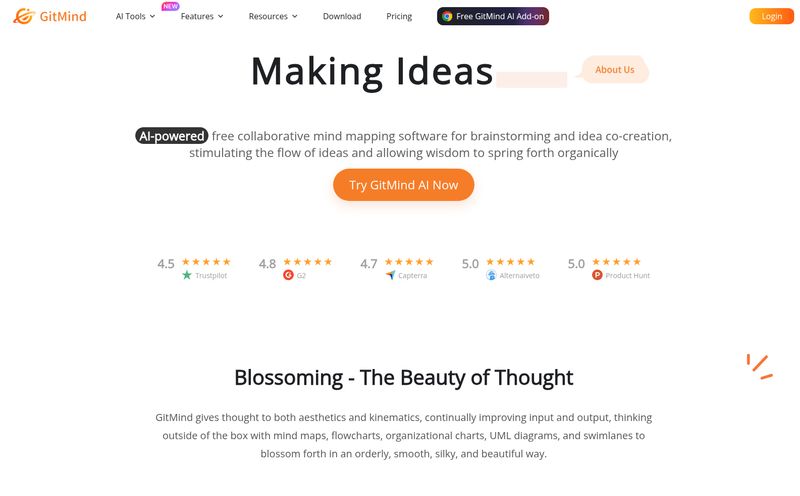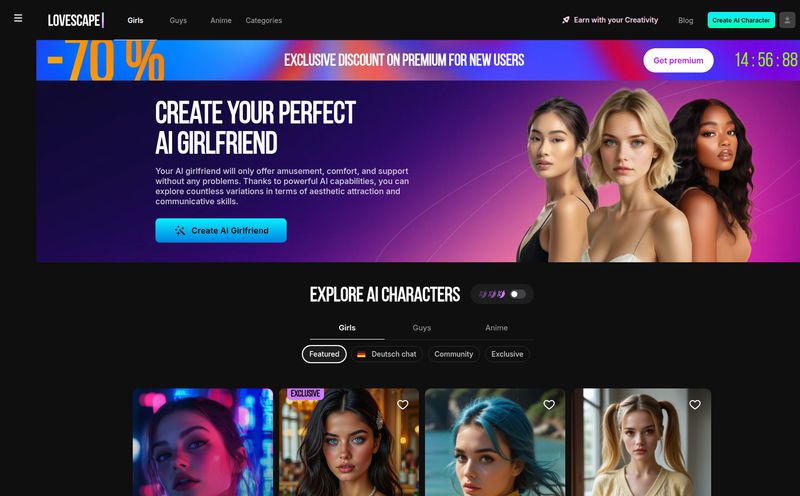The world is a pretty noisy place. Between the 24-hour news cycle, the endless scroll of social media, and just the general pressure of, you know, existing, finding a quiet corner to just unpack your thoughts can feel impossible. Sometimes you just need to vent, to get something off your chest without getting advice, judgment, or a well-meaning but ultimately unhelpful, "have you tried yoga?".
I've been in the SEO and digital trends space for years, and I’ve seen AI sprout up in every corner of our lives, from writing ad copy to recommending what shoes to buy. So, when I stumbled upon a tool bluntly named "Free AI (not a) Therapist," my curiosity was piqued. The name itself is a brilliant piece of positioning—it sets an expectation and then immediately clarifies its own limits. It’s honest. I like that.
But is it any good? Can a piece of code really offer a semblance of support for our cluttered modern minds? I decided to spend some time with it.
What Exactly Is This "Not a Therapist" AI?
At its core, Free AI (not a) Therapist is an AI-powered chatbot designed for self-help. Think of it less like a doctor and more like a training partner for your mind. It’s a private space to articulate your feelings, talk through a problem, or just complain about your terrible commute. The entire premise is built on providing a non-judgmental ear. Or, well, a non-judgmental algorithm, I suppose.
The creators are very, very clear on one thing, and it’s right there in the name: this is not a substitute for professional mental health care. This isn't therapy. It’s a tool. A distinction that is not just important, but ethically necessary in the growing field of mental wellness tech. In an industry where YMYL (Your Money or Your Life) content is under Google's microscope, this kind of transparency is not just good practice, it's a survival tactic.
My First Impressions: Venting into the Void (in a Good Way)
So, I opened it up. The interface is… simple. Almost stark. No cartoon mascots, no calming soundscapes, just a chat window. It felt direct. I started typing, initially just testing the waters with some generic day-to-day frustrations. The AI responded. It didn't offer brilliant, life-altering insights. It mostly just listened, rephrased my concerns, and asked gentle, open-ended questions.

Visit Free AI (not a) Therapist
And you know what? It was surprisingly helpful. The act of simply writing down my jumbled thoughts and having an entity acknowledge them had a clarifying effect. It's like the difference between thoughts bouncing around your skull like a pinball and laying them out neatly on a table. Suddenly, you can see the patterns.
The biggest thing for me, and this is huge, is the privacy. The website states that conversations are stored locally on your device. They aren’t being uploaded to a server, mined for data, or used to train a larger model. After years of seeing how data gets mishandled online, that promise of a truly private conversation feels like a breath of fresh air. It's a closed loop. Just you and the bot on your machine. No prying eyes.
The Good, The Bad, and The AI
Alright, let's break it down. No tool is perfect, especially not a free one. It’s got some definite bright spots, but also some very clear boundaries.
The Upside: Your 24/7, Judgment-Free Sounding Board
The most obvious advantage is its constant availability. Your therapist has office hours; your friends have their own lives. But this bot? It’s there at 3 AM when you’re staring at the ceiling, worrying about a work project or an awkward conversation. And it's free. Totally, 100% free. In a world of freemium models and hidden costs, that alone is something to talk about. The combination of being always on, completely private and costing nothing creates a really low barrier to entry for someone who just needs to talk. It’s a digital diary that whispers back, helping you process your own narrative without the fear of burdening someone else.
The Reality Check: Where This AI Hits Its Limits
Now for the other side of the coin. And this is the important part. This tool is limited. It's not equipped to handle a genuine crisis. It can't diagnose conditions, it doesn't have the nuanced understanding of a trained human professional, and it can't provide the comprehensive support needed for serious mental health issues like severe depression, anxiety disorders, or trauma. If you're in a crisis, logging off this tool and contacting a professional is the only right move. It’s a supportive tool for mild stress, not a lifeline for severe distress. Acknowledging that isn't a criticism of the tool; it's just using it responsibly for what it was built for.
Who Is This Tool Actually For?
So who gets the most out of this? In my opinion, the ideal user is someone who is generally mentally well but is looking for a self-help tool to manage everyday stress and organize their thoughts. It’s for the over-thinker who needs to get out of their own head. It’s for the person who wants to practice self-reflection but finds staring at a blank journal page intimidating. It's for someone who feels lonely but isn't ready or able to seek out professional help just yet.
Think of it as a stepping stone. It can be a great, private first step for someone who is hesitant about mental health support. It can help you become more comfortable articulating your feelings, which is a fantastic skill to have if you do eventually decide to speak with a therapist.
AI in Mental Wellness: A Slippery Slope or a Helping Hand?
The rise of AI in the mental wellness space is fascinating, and frankly, a bit of a minefield. There are some fantastic applications out there. I've seen other tools like Wysa and Woebot that use Cognitive Behavioral Therapy (CBT) principles to help users reframe negative thoughts. They're all part of a growing trend to make mental wellness more accessible.
But there's an ethical tightrope to walk. The danger is when these tools over-promise or when users mistake them for real therapy. That’s why the explicit "not a therapist" branding here is so refreshing. It shows a level of self-awareness and responsibility that I wish more tech companies would adopt. It’s not trying to be a doctor; it's trying to be a helpful, digital friend. And sometimes, that's enough.
Frequently Asked Questions
- Is Free AI (not a) Therapist really free?
- Yes, based on all available information, the tool is completely free to use. There are no subscriptions or hidden charges mentioned.
- How is my data kept private?
- The platform states that all conversations are stored locally on your computer or device. This means your chat logs are not uploaded to their servers, offering a high degree of privacy.
- Can this AI chatbot diagnose mental health conditions?
- Absolutely not. The tool is explicitly designed for self-help and emotional exploration. It is not a medical device and cannot provide diagnoses. For a diagnosis, you must consult a qualified healthcare professional.
- Is this a good alternative to real therapy?
- No. It is a supplement or a self-help tool, not an alternative. A human therapist provides comprehensive, nuanced, and adaptive care that an AI cannot replicate. This tool is best used for daily stressors, not for deep-seated psychological issues.
- What should I do if I'm in a crisis?
- If you are experiencing a mental health crisis, please do not use this tool. Contact a crisis hotline immediately. In the U.S., you can call or text 988 to reach the Suicide & Crisis Lifeline. In the UK, you can call 111.
My Final Thoughts
So, what’s the verdict? The Free AI (not a) Therapist is a fascinating and, in my opinion, a responsibly designed tool. It knows its place. It's not a revolutionary cure-all, and it won't solve all your problems. But it doesn't claim to.
What it does offer is a quiet, private, and accessible space to untangle your thoughts. It’s a modern-day journal with a bit of a personality. For the right person, in the right context, that can be incredibly valuable. Just remember the name—it’s a helpful AI, but it's not a therapist.
Reference and Sources
- The 988 Suicide & Crisis Lifeline: For immediate, confidential support, please visit https://988lifeline.org/ or call/text 988.
- National Alliance on Mental Illness (NAMI): A key resource for mental health information and support. https://www.nami.org/



